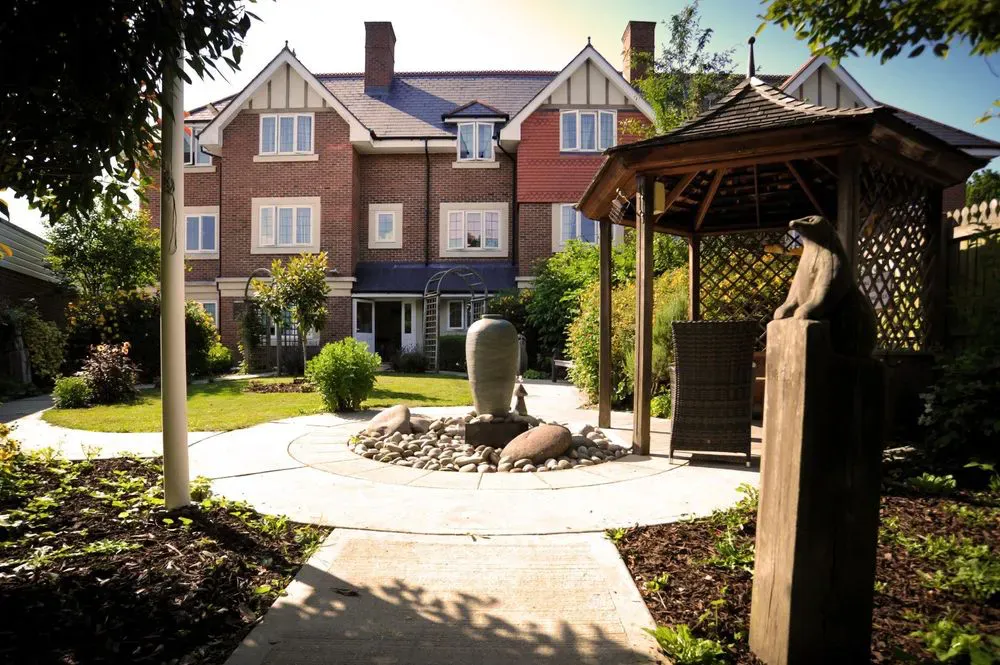The Different Types of Care Available To Older Adults Explained

Estimated Reading Time: 15 minutes
There are numerous types of care available in the UK. This care can be provided in various settings, including in a care home or within your own home via home care.
Below, we’ve explained the most common types of care available to you, how you can access them, who they’re aimed at and where they’re provided.
The various costs of care in this article are based on the care homes and home care providers we're partnered with.
Browse recommended local homes
Compare care homes with availability near you.
Explore the different types of care available:
- Residential care and personal care
- Nursing care
- Dementia care
- Respite care
- Convalescent care
- Palliative care and end-of-life care
- Hospice care
- Domiciliary care
- Live-in care
- Overnight care
- Companionship care
- Assisted living
- Retirement homes
- Adult day care
- Informal care
Residential Care and Personal Care
Residential care is for anyone who may struggle to live independently and require additional support with everyday tasks like washing and dressing, but doesn't need specialist nursing care.
Personal care is provided in a residential care home and is also available as part of home care. Some examples of personal care are:
- Helping you get in and out of bed
- Helping you get dressed and undressed
- Washing and bathing
- Using the toilet
- Other personal hygiene tasks
- Administering oral medications
- Changing incontinence pads
Here are some of our best residential care homes across the UK:
- Trevarna in Cornwall
- Brookwater House in Enfield
- Cofton Park Manor in Birmingham
- Seacroft Grange in Leeds
- Hollie Hill in County Durham
How much does residential care cost?
The average cost of the residential care homes we list - which offer personal care - is:
- England - £1,404 per week, £6,084 per month and £73,008 per year
- Scotland - £1,439 per week, £6,236 per month and £74,828 per year
- Wales - £1,223 per week, £5,300 per month and £63,596 per year
We also have an article explaining care home costs in greater detail.
What’s the average age of people who require residential care?
Data based on our users shows that 19% who require residential care are aged between 65 and 74. 32% are aged between 75 and 84, 41% are aged between 85 and 94 and 8% are 95 or older.

Nursing Care
Nursing care is for people who require specialist medical support from registered and qualified nurses. Everyday tasks within nursing care include administering intravenous medication, treating wounds, monitoring vital signs and providing other care to people with illnesses and conditions requiring medical attention.
In a care setting such as a nursing home, there must always be at least one nurse on call, as this care needs to be available 24/7. District nurses can support residents in residential care homes as well.
Nursing care can also be provided at home, including specialist support for physical disabilities, administering intravenous drugs, wound dressing, stoma care and more.
Here are some of our best nursing care homes:
- Hengist Field in Kent
- The Lawns in Essex
- Lawn Park in Nottinghamshire
- Sherwood Court in Preston
- Ponteland Manor in Newcastle upon Tyne
How much does nursing care cost?
The average cost of the nursing care homes we list is:
- England - £1,562 per week, £6,769 per month and £81,224 per year
- Scotland - £1,549 per week, £6,712 per month and £80,548 per year
- Wales - £1,380 per week, £5,980 per month and £71,760 per year
What’s the average age of people who require nursing care?
Data based on our users shows that 14% who require nursing care are aged between 65 and 74. 37% are aged between 75 and 84, 42% are aged between 85 and 94 and 7% are 95 or older.
Dementia Care
Dementia care uses specialist techniques to look after an individual with compassion and in a thoughtful way. The goal is to promote wellbeing through person-centred care.
Somebody living with dementia may require medical support and personal care. They’ll also benefit from a routine, being treated with dignity and respect, dementia-friendly activities and specialist equipment/facilities like memory boxes and sensory gardens.

Somebody living with a form of dementia such as Alzheimer’s will likely need an increasing amount of care as their condition progresses.
Dementia care is usually provided in a dementia care home but can also be provided in the comfort of your own home, including early-stage dementia care at home, late-stage dementia care at home and specific Alzheimer’s care at home.
Here are some of our best dementia care homes:
- Alston House in Eastleigh
- Cambridge Grove in Cambridge
- Charnwood Care Home in Nottingham
- Castle Keep in Kingston upon Hull
- Airthrey Care Home in Falkirk
How much does dementia care cost?
The average cost of dementia care homes we list is:
- England - Residential dementia care is £1,450 per week, £6,283 per month and £75,400 per year. Nursing dementia care is £1,604 per week, £6,951 per month and £83,408 per year
- Scotland - Residential dementia care is £1,460 per week, £6,327 per month and £75,920 per year. Nursing dementia care is £1,568 per week, £6,795 per month and £81,536 per year
- Wales - Residential dementia care is £1,258 per week, £5,451 per month and £65,416 per year. Nursing dementia care is £1,400 per week, £6,067 per month and £72,800 per year
What’s the average age of people who require dementia care?
Data based on our users shows that 10% who require dementia care are aged between 65 and 74. 42% are aged between 75 and 84, 44% are aged between 85 and 94 and 4% are 95 or older.
Respite Care
Respite care is a short-term form of care, often lasting for just a few weeks. Your regular carer may take a well-earned break while you temporarily receive respite care.
Respite care varies, depending on what type of support is needed. It can be for people with personal, nursing or dementia needs, along with those recovering from an illness or injury.
The most common type of respite care is within a care home, but respite home care is also popular. Our 2024 Care Seeker Survey shows that older adults often use temporary respite care as a way of transitioning into permanent care. The most common duration for respite care is around two weeks.
Here are some of our best respite care homes:
- Osborne Court in Bristol
- Eden Court in London
- Holmer in Herefordshire
- Acacia Lodge in Greater Manchester
- Cleveland House in Huddersfield
How much does respite care cost?
How much respite care costs depends on the care you or your loved one require. For example, residential respite care is usually cheaper than nursing or dementia respite care.
In the UK, the average weekly cost of self-funded residential respite care is £1,488. Nursing respite care is £1,638, residential dementia respite care is £1,552 and nursing dementia respite care is £1,678.
Convalescent Care
Convalescent care is a temporary form of care given to people who are recovering from an injury or illness, or after they’ve had an operation.
Convalescent care is often used by people who no longer need to stay in the hospital, but still require regular support from carers and nurses, along with personal care support, allowing the care recipient to focus on their recuperation and recovery.
Convalescent care can be provided at home or in a convalescent care home. A care home offering convalescent care will have trained medical staff.
Palliative Care and End-of-Life Care
Palliative care is for people with serious or terminal illnesses. This includes people with an advanced stage of dementia.
The focus of palliative care is providing symptom relief and making people feel as comfortable as possible, rather than trying to find a cure. How long palliative care lasts depends on the individual - it could be several months or even years.
Palliative care can be provided in a palliative care home (or in a specialised wing of a care home) or through palliative care at home.
Meanwhile, end-of-life care is considered one of the later stages of palliative care. It’s given as somebody nears the end of their life. Similarly, the goal is to help the person live as comfortably as possible, until they pass away with dignity.
Here are some of our care homes that offer palliative care:
- St George’s in Surrey
- Field Lodge in Cambridgeshire
- Fernhill House in Worcestershire
- Cottingley Hall in Bradford
- Beacher Hall in Reading
Hospice Care
Hospice care is most similar to end-of-life care. While there’s no specific time when someone will begin receiving end-of-life care, people tend to start receiving hospice care when a medical professional such as your GP says you have six months or less left to live. Hospice care is aimed at people living with incurable illnesses.
Hospice care takes a holistic approach that focuses on easing the symptoms of conditions and providing emotional and practical support where needed.
Hospice care can be provided in a care home, at home or in a hospice itself. If your loved one goes into a hospice, this stay won’t always be permanent. Often, people will move out of a hospice if their condition improves and they’d rather live at home, but may then move back into a hospice in the future.
Domiciliary Care
Also known as hourly care, domiciliary care is where a carer visits your loved one’s home at various points throughout the week. The amount of care given is tailored to the individual. Some people only require a couple of hours a week, while others need much more. The length of visits is also flexible, depending on what individual providers can offer.
A range of services are offered through domiciliary care, such as cleaning and other household chores, food preparation and cooking, personal care, administering certain medications and generally offering a friendly face and somebody to talk to.
We’re partnered with the country’s best domiciliary care providers, and you can find domiciliary care near you through Lottie.
How much does domiciliary care cost?
The average cost of domiciliary care offered by our home care partners is £27 per hour. So, receiving 10 hours of domiciliary care a week would cost around £270 per week, £1,170 a month and £14,040 a year.
We also have an article explaining care at home costs in greater detail.
Live-In Care
Through live-in care, a fully trained carer will move into your loved one’s home permanently, meaning they’ll have access to round-the-clock care.
People prefer live-in care to domiciliary (hourly) care when visits throughout the week are no longer enough.
A live-in carer can assist with daily tasks, help you with personal care, manage your medication and offer mobility support where needed.
We’re partnered with the country’s best live-in care providers, and you can find live-in care near you through Lottie.
How much does live-in care cost?
The average cost of live-in care offered by our home care partners is £206 per day. So, if you receive permanent live-in care, this would cost around £1,442 per week, £6,249 a month and £74,984 a year.
Overnight Care
Overnight care is where a carer will stay with your loved one overnight. They’ll be on hand to provide any support should your loved one wake up. Often, an overnight carer will take over while a live-in carer sleeps.
Overnight care is aimed at older adults who need regular supervision, including those who often wander, have dementia, limited mobility or a complex medical condition.
There are two types of overnight care. Overnight sleeping care is for people who don’t require regular assistance but would benefit from having somebody present at night. Overnight waking care is for people with greater care needs who require regular attention and assistance at night.
An overnight sleeping carer will usually assist on two occasions before the service is classed as overnight waking care.
How much does overnight care cost?
The two types of overnight care have differing prices.
The average cost of overnight sleeping care offered by our home care partners is £178 per night. If you were to receive overnight sleeping care seven nights a week, it would cost around £1,246 a week, £5,399 a month and £64,792 a year.
The average cost of overnight waking care offered by our home care partners is £230 per night. If you were to receive overnight waking care seven nights a week, it would cost around £1,610 a week, £6,977 a month and £83,720 a year.
Companionship Care
Companionship care is aimed at older adults who are largely independent but would benefit from some company on a regular basis, as well as household assistance and support with personal care in some cases.

Companionship care is usually provided within the comfort of your own home. A carer will visit you throughout the week. How often they visit and for how long is down to the individual.
Companionship itself is also flexible. It could be as simple as having a nice chat over a cup of tea, or helping you with various errands inside and outside your home.
We’re partnered with the country’s best home care providers, many of which offer companionship care.
Assisted Living
This is similar to sheltered housing. In an assisted living facility, support is on hand where needed, such as personal care (including help with your personal hygiene and getting dressed and undressed). However, residents are also able to maintain their independence by living in their own self-contained property.
It may be determined that you qualify for assisted living after getting a care needs assessment by social services. Whether you’re eligible depends on if your local council thinks this type of accommodation suits your needs.
In the UK, assisted living can be rented or purchased.
You can find examples of assisted living throughout the UK using Housing Care’s directory.
Retirement Homes
Retirement homes are purpose-built developments specifically aimed at older adults. There’s usually a minimum age, such as 55, 60 or 65.
A retirement home often comprises numerous properties, such as one, two or three-bedroom apartments. These apartments will contain features such as spacious bedrooms, walk-in wardrobes and fully equipped kitchens.
They’re also very accessible, with wheelchair access throughout.

Retirement homes also have communal facilities where residents can spend time with each other or with their family and friends. These facilities vary from development to development, but could include:
- Cafés and restaurants
- Lounge areas
- Gardens
- Fitness centres
- Beauty salons
- Cinema rooms
How much do retirement homes cost?
We offer retirement homes in England and Scotland. The amount you’ll pay depends on the property size and whether you choose to buy or rent.
According to our internal data, the average cost of purchasing a one-bedroom property in England is £855,000, while a two-bedroom property costs £865,768. A one-bedroom property costs an average of £1,983 a month to rent, while a two-bedroom property costs £3,781 a month.
According to our internal data, the average cost of purchasing a one-bedroom property in Scotland is £173,500, while a two-bedroom property costs £244,350. A one-bedroom property costs an average of £868 a month to rent.
We have an article explaining retirement home costs throughout the UK for more information.
Adult Day Care
Adult day care supports people who need additional care throughout the day. People will visit an adult day care centre for several hours at a time to receive this care. These centres are sometimes within a care home or a building such as a village hall. There are also specialist adult day care centres.
The care offered varies from centre to centre, but personal care and companionship care are commonly provided, along with support for people living with dementia.
These centres may also put on a range of activities for people to participate in and serve up delicious warm meals throughout the day.

How to find adult day care
We list many care homes offering day care services, including:
- Oaktree Court in Somerset
- Chelsea Court Place in London
- Newton House in Lincolnshire
- Abigail Lodge in County Durham
- Kingsacre in Dunbartonshire
Age UK also runs day centres throughout the UK.
Informal Care
A growing number of people in the UK provide informal care. An informal carer is somebody who cares for a family member or friend in some capacity, usually on top of their own separate paid job.
An informal carer could help a loved one with:
- Preparing and cooking meals
- Household chores
- Providing transport
- Administering certain medications
- Helping out with administrative tasks
GOV.UK estimates that in 2021, five million people provided some form of unpaid care in England and Wales alone, with the majority of these people being females.
If you fall within this category, you could be eligible for financial assistance and not realise it. If you provide 35 or more hours of care a week and are on a low income, you could be eligible for Carer’s Allowance. There are other benefits available to carers as well.
Choosing Care For Your Loved One
The two most common care settings are in a care home and through care at home.
Through home care, a paid carer will support you within your home, allowing you to remain as independent as possible while still receiving the care you need. Home care is best for people who wish to stay at home, while care homes are better for people who would prefer to live in a purpose-built environment specifically designed to keep them safe and provide a high level of care.
The specific type of care you require depends on your individual needs. For example, companionship or domiciliary care could be better if you're fairly independent but need extra support. In contrast, nursing care and live-in care are tailored to individuals with greater care needs.
Meanwhile, dementia care and palliative care are aimed at people with specific conditions, and in some cases, who may be nearing the end of their lives.
If unsure, you or your loved one can get a care needs assessment. This assessment will determine what type of care is best suited. A financial assessment will follow this, determining whether you’ll pay for care or if you’re eligible for funding assistance from your local authority.



